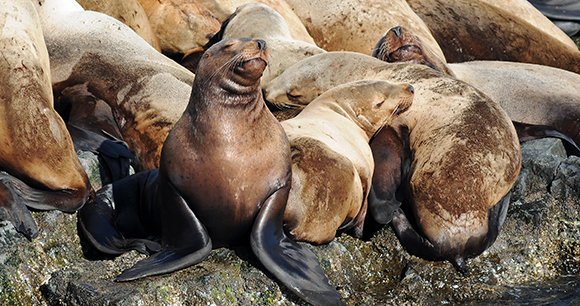
Washington, DC—The Animal Welfare Institute is gravely disappointed that some of the recommendations released today by the Southern Resident Killer Whale Recovery and Task Force fail to take bold action to save these endangered whales while ignoring public support for dam removal and public opposition to sea lion killings.
In March, Washington Gov. Jay Inslee established the task force with the directive to develop “swift near-term actions and effective long-term actions necessary to recover these iconic and endangered animals.” Today, the task force published its final report, presenting 36 recommendations to the governor.
AWI opposes a task force recommendation to continue to study dam removal, rather than strategically targeting certain dams for removal. AWI also strongly opposes the recommendation to pursue lethal control of sea lions in the Columbia River Basin as a means of increasing the number of salmon that reach the spawning grounds. Killing sea lions will not help restore salmon runs, especially given the pressures of human fishing on these salmon stocks.
Moreover, the task force has disregarded public input. Its original dam removal recommendation had strong public support yet was eventually withdrawn. The public has consistently opposed the lethal removal of sea lions in the Columbia River Basin. The task force, however, supported and expanded on a federal proposal for a cull among its final recommendations.
“The lethal removal of pinnipeds is not supported by the public nor is it based on science, best available or otherwise,” stated Dr. Naomi Rose, marine mammal scientist for AWI. “The pursuit of this proposal, and its inclusion in the final recommendations to the governor, show the political calculus at the heart of the task force.”
The proposal to remove four low production dams along the Lower Snake River was so widely backed by the public in the last comment period that task force staff did not have enough time to process the nearly 9,000 supportive comments before the final meeting. The task force noted in its final recommendations that “in the Columbia River Basin, dams completely block passage to more than 55 percent of the spawning and rearing habitat historically used by Chinook.” Yet the group does not propose any actions leading to immediate dam removal.
“AWI has fervently maintained that dam removal would yield the greatest benefit toward restoring functional ecosystems in the Columbia River Basin and Washington state waters,” said Ryan Ososki, policy advisor at AWI. “Dams, culverts and other barriers throughout the Columbia River basin have had, in our opinion, the single most damaging impact on salmon stocks and southern resident killer whales.”
AWI believes that the strategic removal of dams along the Lower Snake River would be most beneficial to orca and salmon recovery.
“We’re deeply disappointed by the task force’s inclusion of several relatively inconsequential actions among its recommendations, while failing to promote the bold actions requested by Governor Inslee,” said Cathy Liss, AWI’s president. “Southern resident killer whales and the Chinook salmon on which they fundamentally depend are headed toward extinction. We had hoped that the task force would tackle big issues such as dam removal and habitat restoration in order to save these populations.”
Task force documents note that its members sought “consensus” recommendations.
“In an effort to reach consensus, the task force has abandoned its mandate from Governor Inslee to take bold steps to benefit orca and salmon recovery,” stated Liss. “Indeed, the aim of reaching only consensus recommendations has prevented the task force from producing truly substantive proposals for action.”
To view AWI’s comments on the task force’s previous proposals, click here and here.
Margie Fishman, (202) 446-2128, [email protected]